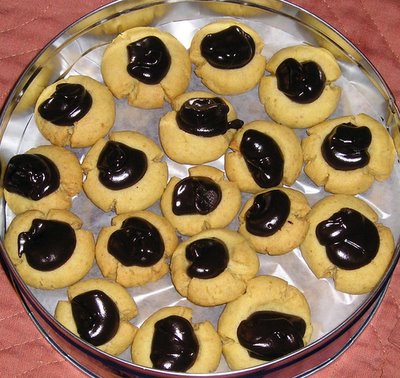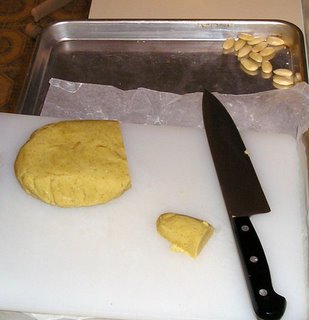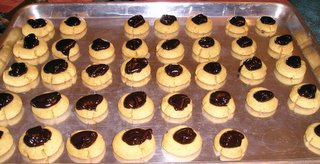Aunt Glegg Learns the Breadth of Bob’s Thumb

Before I head off on a tangent, I should mention that this post is meant to be my entry in the IMBB-SHF virtual cookie swap, and that there is an actual recipe (an easy and good recipe, even) contained in this post. I am a big fan of actual cookie swaps, having done a few at various work places over the years. Inevitably, one walks away from such swaps with a mixed bag, in more than one sense of the word, but it is a good thing to instantly diversify your cookie portfolio, even if some of the cookies aren't necessarily something that you'd make for either yourself or your worst enemy.
I have horribly misnamed these cookies as "thumbprints" when, in fact, I did not use either of my thumbs to press the balls of dough down into the appropriate shape. I had, however, originally intended to use my thumb, which, for some reason that could not be determined without undertaking the hideous and thankless task of plumbing the depths of my subconscious, made me think of a chapter title (which I have appropriated as the title for this post) in George Eliot's The Mill on the Floss, which reminded me not only that I have still not seen the version of Pride and Prejudice that is now in the theatres, but also that when I was as old as nineteen, I still considered George Eliot a superior novelist to Jane Austen, and while that opinion might be defensible if I had based it on reading, for example, Middlemarch and Northanger Abbey, I had, in fact, based it on reading The Mill on the Floss and Pride and Prejudice. Ah, my misspent youth. I comfort myself by thinking that Jane Austen would have been impervious to the insult. (I do not wish anyone to think that I do not find Ms. Evans a very fine writer. When I was finally able to wrap my mind around Middlemarch, I found it a wondrous accomplishment, indeed, but when I think of a perfect novel, I still think of Pride and Prejudice, except on the days when I think of Emma.)
Anyway. I think it is highly unlikely that either Elizabeth Bennett or Maggie Tulliver (or their respective cooks) would have made these cookies because I don't believe that they would have had access to a substantial, ready supply of chocolate, but I may be mistaken on that account, in which case, I shall appreciate corrections from any culinary historians who happen to be reading. Fortunately, I can lay my hands on the ingredients for these very simple cookies just about any time I want to.
Orange Almond Shortbread Thumbprints with Ganache
1/2 cup toasted blanched almonds
1/4 cup turbinado sugar
zest of one orange, grated
1 stick butter
1 cup all purpose flour
1 tsp. vanilla extract
1/3 cup heavy cream
8 ounces semisweet chocolate (chopped or chips)
In the bowl of your food processor, process the almonds until they are very finely chopped, but not oily. Add the sugar and the orange zest, and process again. Cut the butter into six to eight pieces, add to the bowl, and process until the whole deal masses up into a ball. Add half the flour and process again until well blended. Add the vanilla and process again. Add the rest of the flour and process until the mixture works itself into a cohesive mass. Take it out of the food processor and knead it very briefly, then wrap in plastic wrap and refrigerate.
Preheat the oven to 350 degrees.
 Remove the dough from the refrigerator and cut into small pieces of more or less uniform mass. You should have approximately forty pieces. Roll the pieces into balls and place them on your cookie sheet. The centers do not need to be more than two inches apart. All forty of them will fit on a half-sheet pan.
Remove the dough from the refrigerator and cut into small pieces of more or less uniform mass. You should have approximately forty pieces. Roll the pieces into balls and place them on your cookie sheet. The centers do not need to be more than two inches apart. All forty of them will fit on a half-sheet pan.Using either your fingertip or an implement that is round and blunt and shaped much like your fingertip, press a depression into each ball. This will also flatten them out. You can repair major cracks, but just ignore minor ones.
Bake in the middle of the oven for approximately twenty minutes. They will be golden brown on the top and if you carefully lift one off the sheet, it will be slightly darker brown on the bottom. Remove the pan from the oven to cool.
While the cookies are cooling, make the ganache. Put the cream in a pyrex measuring cup and heat for one minute on high in the microwave. Dump the chocolate pieces into the cream and stir with a fork until smooth. If the chocolate does not melt completely, put the mixture back in the microwave on high for another fifteen seconds and stir again. Repeat if necessary.
Using a teaspoon, fill the cookie hollows with ganache.
Notes:
The ganache in this recipe is very thick, so that you can overfill the cookies. You will, after filling all the cookies, still have some ganache left. What you do with it is between you and your conscience.
If you do not have turbinado sugar sitting around, you can use either white or brown sugar instead.
 You could, of course, fill these cookies with something other than chocolate (especially if you're one of those unfortunate people who don't find the combination of fruit and chocolate pleasing; I once made a friend a chocolate oblivion truffle torte for his birthday, and I was preparing to serve it to him by putting a pool of raspberry puree on the plate, and he informed me that he did not like chocolate and fruit together, so I gave him the torte alone, he ate it with much pleasure, and I had twice as much sauce for myself: a win-win situation). Raspberry preserves or orange marmalade for example. Lemon curd. In some of those cases, you may want to consider whether orange zest or lemon zest is the better choice. The orange and the chocolate make a very rich, very good combination that is positively decadent. Miss Bennett would surely not approve, and her superior judgment would keep her from indulging, but Miss Tulliver would likely eat it with relish (this very difference was, in fact, the reason I initially preferred The Mill on the Floss to Pride and Prejudice, but it no longer seems reasonable to judge a novel entirely by whether the heroine would fully appreciate my cooking). The cookie is very crisp, and the ganache is very tender, and I find the contrast in textures especially pleasing.
You could, of course, fill these cookies with something other than chocolate (especially if you're one of those unfortunate people who don't find the combination of fruit and chocolate pleasing; I once made a friend a chocolate oblivion truffle torte for his birthday, and I was preparing to serve it to him by putting a pool of raspberry puree on the plate, and he informed me that he did not like chocolate and fruit together, so I gave him the torte alone, he ate it with much pleasure, and I had twice as much sauce for myself: a win-win situation). Raspberry preserves or orange marmalade for example. Lemon curd. In some of those cases, you may want to consider whether orange zest or lemon zest is the better choice. The orange and the chocolate make a very rich, very good combination that is positively decadent. Miss Bennett would surely not approve, and her superior judgment would keep her from indulging, but Miss Tulliver would likely eat it with relish (this very difference was, in fact, the reason I initially preferred The Mill on the Floss to Pride and Prejudice, but it no longer seems reasonable to judge a novel entirely by whether the heroine would fully appreciate my cooking). The cookie is very crisp, and the ganache is very tender, and I find the contrast in textures especially pleasing.Because the ganache is tender, if you want to store the cookies in more than one layer, you should put one layer in the bottom of your cookie tin and then put the cookies in the freezer for eight minutes to make the tops firm enough to stack. Cover the first layer with a round of waxed paper, then add a second layer of cookies, and repeat the process until all of the cookies have been placed in the tin. Then store them in the refrigerator, but let them come to room temperature (remove them from the tin and place them in a single layer first) before serving.
If you want to give these cookies as a gift to a host at a holiday party, you will not want to purchase a special tin for the task. Instead, present them to the recipient in a regular butter cookie tin (that you will have cleaned out, of course). That way, he (or she) will first think that you are horribly cheap and lazy for having brought her (or him) a three-dollar tin of store-bought cookies. Then, upon opening the tin, he (or she) will next think that you have made the common (and good, but perhaps ordinary) peanut butter cookie topped with a milk chocolate kiss. Only upon actually tasting a cookie will your recipient find that she (or he) has been given something homemade, delicious, and rare. And then he (or she) will both appreciate your cleverness in having pulled one over on her (or him) and your thoughtfulness in having concealed your riches in a plain wrapping, making it acceptable for him (or her) to put the tin away for herself (or himself) without offering any to his (or her) other guests. I suppose that this sort of maneuver might be considered devious, but if we learn anything from reading Jane Austen it's that polite society is little more than a cover story for vicious parlor intrigues, and if you want to acquire for yourself a handsome gentleman with ten thousand a year, you're going to have to be either beautiful, charming, and clever, or (and I may be paraphrasing just a little bit here) have a collection of damned good recipes and know how to use them.

9 Comments:
WOW! I want cookies so badly now.
These look very good. A person who does not like the combo of orange and chocolate is suspect, in my book. (my book: Persuasion over Middlemarch, by a hair)
These look and sound yummy. I do believe even Mr. Darcy would agree!
They look delicious...ooh, that glistening chocolate...
Thank you my dear friend. These cookies are just great. We like the way you explain it so lucidly.
My Dhaba's rock cookies are yet to be released. Can't wait anymore :-)
I love orange and chocolate together!
Haha, ditto Nupur- the glisten of the chocolate is so inviting! You cant ever go wrong with pairing orange and chocolate. Great entry for the cookie swap.
These look amazingly good -- *and* I love the narrative :)
j
I haven't tried the cookies yet, but I love the Jane Austen comment. That's exactly how I feel. But I do like Northanger Abbey. I like all of Austen's works. And I do intend to try the cookies. Anything with almonds is worth trying.
Post a Comment
<< Home